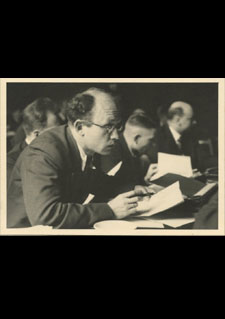Background of the Breslau Confessional Synod
The members of the synod had already discussed a statement on the “Destruction of Life Unworthy of Living” at the 9th Confessional Synod, which had convened in Leipzig on October 12 and 13, 1940. A final resolution on the issue had not been passed. A theological report had, however, been authorized, which Heinrich Vogel, a theologian from Berlin, was supposed to draft.
The report, which unambiguously classified the killing of people with illnesses as murder of defenseless individuals, was submitted to the 10th Confessional Synod in 1941. Despite support, most notably from Lothar Kreyssig, a district judge in Brandenburg, and Ernst Wilm, a pastor in Westphalia, an unambiguous resolution was not passed because it was considered to be too risky.
Dietrich Bonhoeffer provided another theological bearing in the spring of 1943 shortly before his arrest. He unambiguously declared that the state’s power is also bound by God’s commandments and can demand obedience only in this context.
In the run-up to the Breslau Synod, the Silesian Confessional Synod had met in August of 1943. Citing the Theological Declaration of Barmen, it had found clear words in a “Statement on the Church’s Path” that separated the church from the state. It took up the positions of the Theological Declaration of Barmen and modified them for current events:
As Jesus Christ is God's assurance of the forgiveness of all our sins, so, in the same way and with the same seriousness he is also God's mighty claim upon our whole life” (Barmen 2).
The church must preach God’s holy and merciful will, as it is revealed in the Ten Commandments and the message of God’s justifying grace, for all areas of our human life. The church cannot recognize any areas of our human life subject to their own laws, which are free from Christ’s dominion.
The church is in conflict with this confession when, fleeing the public sphere and cutting itself off like a sect, it keeps quiet about Jesus Christ’s claim to authority over judgment and grace in the face of the major issues of political and national events such as war, law and business.
We therefore must bear witness without fear of humans that the public sins of our age – scorning God, disdaining our neighbor’s honor and life, destroying the family, disintegrating sexual morals – are also affected, judged and forgiven by God’s word. Wherever the church no longer ventures to preach the Ten Commandments in the face of the sins of its age, its preaching of the forgiveness of sins also loses authority and credibility.
Wherever the church of Christ preaches God’s commandments only insofar as it is certain of the approbation of the earthly powers of its age, God’s claim on our entire life is denied and God’s assurance of the forgiveness of all of our sins withheld. (Kirchliches Jahrbuch 1933–1944, 382)
Source / title
- © Evangelisches Zentralarchiv in Berlin, Best. 500, Nr. 120

